‘We settled the score’: Netanyahu says as Hezbollah chief Hassan Nasrallah dies in Israel air strikes
Benjamin Netanyahu tells Israelis he ordered the killing of Hassan Nasrallah in massive air strikes in Beirut to enable the safe return of Israel’s northern residents, and warns Iran: ‘There’s nowhere beyond our reach.’
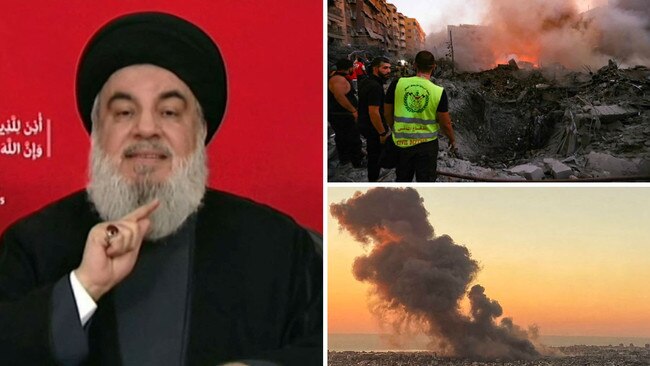
Benjamin Netanyahu has told Israelis he ordered the killing of Hezbollah chief Hassan Nasrallah to enable the safe return of Israel’s northern residents and the release of hostages held in Gaza, and warned Iran: “There’s nowhere beyond our reach.”
Overnight, the Israeli Defence Forces and the Iran backed militant group confirmed the death of Nasrallah in a massive air strike on Beirut, with what is believed to be 5000-pound bunker-busting bombs.
In a statement, the IDF said Nasrallah, who has led the Iran backed group for 32 years, “would no longer be able to terrorise the world.”
Hezbollah also confirmed his death, posting a picture of their leader on Telegram with the words “Sayyed Nasrallah Martyred.”
In his first public remarks since the strikes on the Beirut suburb of Dahiyeh, the Prime Minister said Israel had “settled the score” with a “mass murderer” responsible for the killings of countless Israelis.
Shortly after arriving home after giving an address to the UN, Mr Netanyahu said Nasrallah and his fighters were “the architects of the plan to destroy Israel.
“He wasn’t another terrorist; he was the terrorist … the central engine of Iran’s axis of evil,” he said in a video statement.
Mr Netanyahu said that he had realised early last week that despite the bombardment of Hezbollah targets in Lebanon and the deaths and injuries caused by exploding pagers and walkie-talkies, only Nasrallah’s death would allow Israel’s northern residents to return home.
“Eliminating Nasrallah was an essential condition for achieving the aims that we have set out — returning the residents of the north safely to their homes and changing the balance of power in the region for years,” he said, adding that as long as Nasrallah remained alive, “he would have quickly rehabilitated Hezbollah’s capabilities.
“So I gave the order and Nasrallah is no longer with us.”
In a direct warning to Iran, he said: “Those who strike at us, we will strike at them. There is nowhere in Iran or the Middle East beyond the reach of the long arm of Israel, and today you know how true that is.”
Mr Netanyahu said the death of Hezbollah’s long time leader would also help bring the hostages in Gaza home.
“The more (Hamas leader Yahya) Sinwar sees that Hezbollah will no longer come to his aid, the greater the chances of returning our captives.” he said, adding that Israel was “determined to continue striking our enemies”.
However he warned: “The work is not yet done, adding: “We will face significant challenges in the days ahead, and meet them.”
As if to underline his warnings, a missile fired from Lebanon impacted in an open area near Jersualem causing a large brush fire, as the Israeli military continued to pound Hezbollah targets.
Nasrallah’s death ‘a measure of justice’: Biden
US President Joe Biden said Nasrallah’s death was “a measure of justice for his many victims, including thousands of Americans, Israelis and Lebanese civilians”.
Washington supports Israel’s right to defend itself against “Iranian-supported terrorist groups” and the “defence posture” of US forces in the region would be “further enhanced”, Biden added in a statement.
Footage showing the moment the Missile Impacted earlier to the East of Jerusalem in the West Bank, resulting in Damage to a nearby Electrical Line and causing a Power Outage to nearby Communities. pic.twitter.com/2t3ZRib5RJ
— OSINTdefender (@sentdefender) September 28, 2024
Earlier, Israeli officials said Nasrallah had been targeted in order to avoid a ground war in Lebanon.
Speaking to reporters in New York, the officials described Nasrallah as a “lynchpin” of Hezbollah and Iranian aggression toward Israel.
The death of Nasrallah is major blow to Hezbollah, which has lost most of its top commanders to Israeli strikes and had its forces decimated in a series of pager and walkie-talkie explosions attributed to Israeli intelligence service Mossad.
Nasrallah oversaw Hezbollah’s transformation into the world’s largest and most heavily armed non-state militia with a huge arsenal provided by Iran and its integration into Lebanon’s political system.
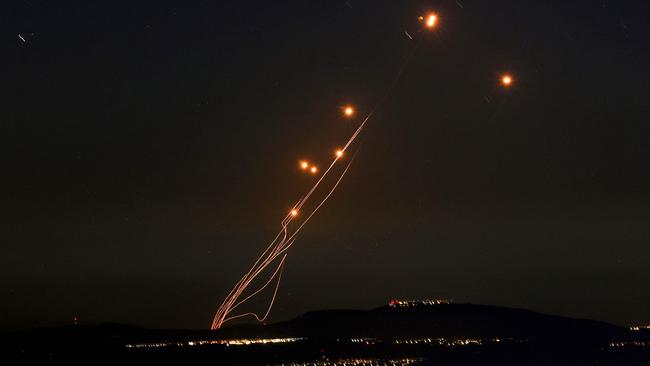
But he was left isolated after successive assassinations including that of top commander Fuad Shukr, killed in an air strike on his apartment on the upper floors of a southern Beirut residential building, where he had been summoned by a phone call shortly before. Most recently, the militant group’s air defences chief was killed in a strike on Friday (AEST).
In a surprise twist however, on Friday Arab media reported that the organisation was looking to replace Nasrallah, whom they blame for the deaths of so many commanders and fighters. According to the al-Arabiya news website, Nasrallah had become “nervous” and was believed to be taking sedatives.
An adviser to Iranian supreme leader Ali Khamenei told Iranian state television: “Any leader of the resistance will be replaced.”
“The resistance has strong leaders and cadres, and every leader who is martyred will be replaced,” Ali Larijani added.
IDF warns of more strikes
Earlier, Israel Defence Forces spokesman Daniel Hagari said there would be more strikes to come targeting the Iran-backed group’s weapons arsenal, which is stored beneath residential homes in Beirut’s southern suburbs.
The military also pounded Hezbollah targets in the southern city of Tyre.
Later on Saturday, Israeli media reports said the IDF announced that it was attacking Hezbollah targets in Bekaa in southern Lebanon.
According to reported initial estimates from Israeli defence officials, some 300 people were killed in the latest strikes. A source close to Hezbollah said the initial wave of strikes had levelled six buildings, and according to a preliminary toll, six people were killed and 91 wounded.
After the Beirut strikes, Hezbollah said it had fired more rockets into Israel “in defence of Lebanon and its people”. There were no immediate reports of casualties.
כך ×–×” × ×¨××” ×‘×©×›×•× ×ª ×-לילקי בד××—×™×” בביירות | תיעוד pic.twitter.com/Z95X8oLBqL
— ספיר ליפקין | Sapir Lipkin | سابير ليبكين (@sapirlipkin) September 27, 2024
Warning of “challenging” days to come, Rear Admiral Hagari said Israeli Air Force planes were also patrolling the area over Beirut’s international airport, adding they would not allow “hostile planes carrying weapons” to land.
Hezbollah’s surface-to-sea missiles not only endanger our civilians, but also our seas.
— Israel Defense Forces (@IDF) September 27, 2024
When our civilians are targeted, we will defend them—from land, air or sea. pic.twitter.com/UIrw4egxGR
In the second wave of strikes – which came after the IDF called on civilians in the area to evacuate – the IDF said it had targeted buildings where Hezbollah was storing “anti-ship” missiles.
The Israeli army also claimed on Saturday that it killed the commander of Hezbollah’s missile unit in southern Lebanon in an air strike, along with his deputy and several other leaders of the Iran-backed movement.
Israeli fighter jets killed “Muhammad Ali Ismail, the commander of Hezbollah’s missile unit in southern Lebanon, and his deputy,” the military said in a statement on Telegram that added, “other Hezbollah commanders and terrorists were eliminated”.
The Israel Defense Force is calling on Residents of several Buildings within the Dahieh Suburb of Beirut to Immediately Evacuate by at least 500 Meters. pic.twitter.com/7E3MRQbEZR
— OSINTdefender (@sentdefender) September 27, 2024
Israeli fighter jets killed “Muhammad Ali Ismail, the commander of Hezbollah’s missile unit in southern Lebanon, and his deputy,” the military said in a statement on Telegram that added, “other Hezbollah commanders and terrorists were eliminated”.
Rear Adm. Hagari said that until now, IDF strikes had been “targeted assassinations” of top Hezbollah commanders. The latest strikes were larger, and aimed at taking out infrastructure along with top officials he said.
“Over the years, Hezbollah has developed an anti-ship missile arsenal, supplied by Iran,” Rear Adm. Hagari said. “Hezbollah has both threatened and, in the past, carried out attacks on maritime global shipping routes … and carried out attacks on Israeli civilian and military shipping vessels”.
Joe Biden ordered US forces in the Middle East to be adjusted “as necessary,” the White House said after the strikes.
“He has directed the Pentagon to assess and adjust as necessary US force posture in the region to enhance deterrence, ensure force protection, and support the full range of US objectives,” the White House said in a statement.
“Moments ago, the Israel Defense Forces carried out a precise strike on the Central Headquarters of the Hezbollah terror organization…taking the necessary action to protect our people so that Israeli families can live in their homes, safely and securely.â€
— Israel Defense Forces (@IDF) September 27, 2024
Listen to IDF… pic.twitter.com/I4hbN7KkO8
The US said they had no knowledge of or participated in the IDF action.
“We’re gathering information,” the Pentagon said. However Lloyd Austin, the US defence secretary, spoke with his Israeli counterpart Yoav Gallant as the operation was being carried out and the attack planes were in the air.
Mr Netanyahu returned to Israel earlier than planned after addressing the UN General Assembly, as did Lebanese Prime Minister Najib Mikati.
Iran accused the United States of “complicity” in Israeli strikes in Gaza and Lebanon.
“One cannot disregard the US complicity in the crime,” Foreign Minister Abbas Araghchi told the UN Security Council.
Mr Araqchi accused Israel of using several US “bunker buster” bombs to strike Beirut, saying:
“Just this morning, the Israeli regime used several 5000lb bunker-busters that had been gifted to them by the US to hit residential areas in Beirut.”
Ahead of the second wave of strikes, Rear Admiral Hagari confirmed there would be further strikes on the area in the coming hours.
“In the coming hours, we plan to strike strategic capabilities that Hezbollah has concealed in underground infrastructure beneath three buildings in the heart of the Dahiya in Beirut,” he said.
“Hezbollah stores strategic weapons in these buildings beneath the civilian population, allowing for the quick launch of missiles … In the last hour, we addressed the residents of three buildings in Dahiya, informing them that these buildings are housing Hezbollah’s strategic assets, and they must evacuate immediately for their safety and security. Now we will expose how they conceal strategic weapons beneath civilian buildings in the heart of Dahiya.”
The Israel Defense Force is calling on Residents of several Buildings within the Dahieh Suburb of Beirut to Immediately Evacuate by at least 500 Meters. pic.twitter.com/7E3MRQbEZR
— OSINTdefender (@sentdefender) September 27, 2024
Families flee Israeli strikes on Beirut’s southern suburbs
Hundreds of families crammed into vehicles and fled Beirut’s southern suburbs overnight into Saturday after Israel struck the area and warned some districts to evacuate, AFP correspondents said.
Fresh strikes struck Beirut’s southern suburbs early Saturday after huge raids hours before that the Israeli army said targeted Hezbollah’s “central headquarters” in the area.
Bottlenecks formed in the middle of the night on normally deserted streets of the capital, many of them in darkness due to power cuts.
In downtown Beirut’s Martyrs’ Square, or along the seaside corniche boardwalk area, desolate men, women and young children were walking around or sitting on the ground.
“We were at home when there was the call to evacuate. We took our identity papers, some belongings and we left,” said Syrian refugee Radwan Msallam, who lives in Beirut’s southern suburbs.
The father of six children aged between three and 17 said they had “nowhere to go”, adding that they could not return to his war-torn home country.
There hasn’t yet been a direct response from Hezbollah over the strikes.
A senior Israeli official told the Telegraph UK that Israeli Prime Minister Benjamin Netanyahu left Israel for New York, in part, to lull Nasrallah into a false sense of security.
Mr Netanyahu’s address to the UN “was part of a diversion” intended to make Hezbollah’s leader believe that Israel would not make any major move while the PM was in the US, the official said.
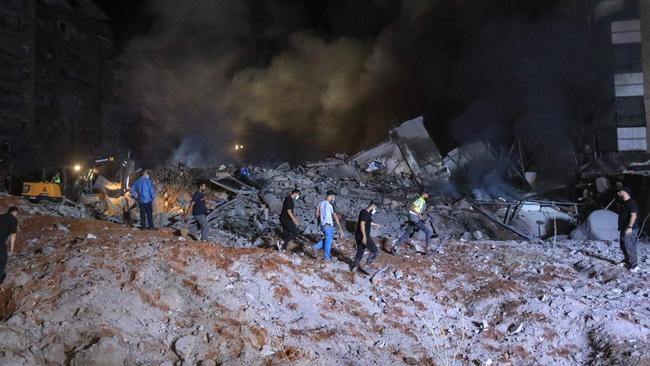
Shortly before the strikes, Israel Prime Minister Benjamin Netanyahu told the UN Israel “won’t rest” until Israelis in the north of the country could return to their homes.
“We won’t rest until our citizens return safely to our homes,” Mr Netanyahu said in a fiery address, amid a public disagreement with the United States and France over a plan for a ceasefire in Lebanon.
“We will continue degrading Hezbollah until all our objectives are attained,” he said, without addressing the US-French peace plan.
After the attack US Secretary of State Antony Blinken addressed a press conference in New York insisting that Israel had a right to self-defence, “but the way it does so, matters’’.
He said: “The events of the past week, and the past few hours, underscore what a precarious moment this is for the Middle East and the world.”
Mr Blinken said that the choices that all parties make “will determine which path this region is on with profound consequences for its people now and possibly for years to come”.
Lebanon has sent military personnel to surround the US embassy in Beirut, in anticipation of riots if it is confirmed that Nasrallah has been killed.
The successive strikes came just before 6.30pm local time (6.30am AEST), leaving panicked residents racing for safety.
“I felt like the building was going to collapse on top of me, as if a rocket was going to hit me and kill me,” said Abeer Hammoud, who lives in Beirut’s southern suburbs.
“When it was over, I breathed a sigh of relief. It was as if I had been given a new lease of life,” said the teacher in her 40s, still reeling from the shock.
The strikes killed at least six people and injured 76, Lebanon’s health ministry said in a preliminary toll.
AFP footage showed several clouds of thick grey and pink smoke rising from the Haret Hreik area of the southern suburbs.
Hammoud said the attacks reminded her of Hezbollah’s last major war with Israel in 2006, when Beirut’s southern suburbs came under intense raids.
The Israeli army said it carried out “a precise strike” on Hezbollah’s “headquarters”, which Israeli media said targeted group chief Hassan Nasrallah – stirring panic among Lebanese fearful of a wider escalation after nearly a year of near-daily exchanges that had been largely restricted to the border area.
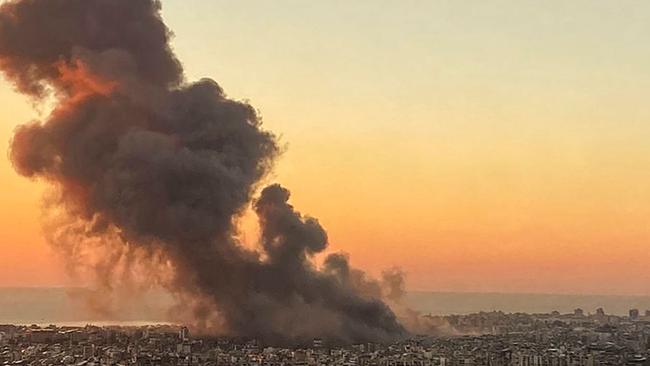
Military analyst Elijah Magnier said the Israeli’s had used multiple GBU-72 bombs, which are 5,000-pounds and penetrates deep underground before detonating. Mr Magnier said Israel wanted to ensure “nobody is going to be alive” suggesting a high value target.
Al Jazeera reported that 10 of the “bunker busting” GBU-72 bombs were launched to flatten an entire city block.
“The scale of devastation underscores the precision and power of these bombs, making survival nearly impossible for anyone inside,’’ Al Jazeera said.
Huge plumes of smoke enveloped the Dahiyeh area on Friday evening as rescue workers tried to find people and used excavators to sift through the rubble.
Lebanon’s health ministry said two people were killed and 76 others wounded.
The Iranian embassy in Lebanon has threatened Israel with “appropriate punishment” for targeting Nasrallah.
“There is no doubt that this reprehensible crime and reckless behaviour represent a serious escalation that changes the rules of the game, and that its perpetrator will be punished appropriately and disciplined,” the embassy said in a statement.
Shortly after Israel’s attack, Hezbollah fighters launched “rocket salvos” at Safed “in defence of Lebanon and its people, and in response to Israeli” attacks on civilians, the group said in a statement.
Islamic Jihad movement in Palestine said: “the deliberate targeting of residential and civilian areas cannot be justified by all the enemy’s lies and all those who applauded the lies of war criminal Benjamin Netanhayu at the United Nations bear responsibility. “We are fully confident that the ongoing reckoning with the enemy will make it pay for its crimes soon.’’
The Palestinian Mujahideen Movement called on all resistance forces to escalate the confrontation.
“Nothing but force and resistance will curb the arrogance of this criminal enemy,’’ they said.
With agencies

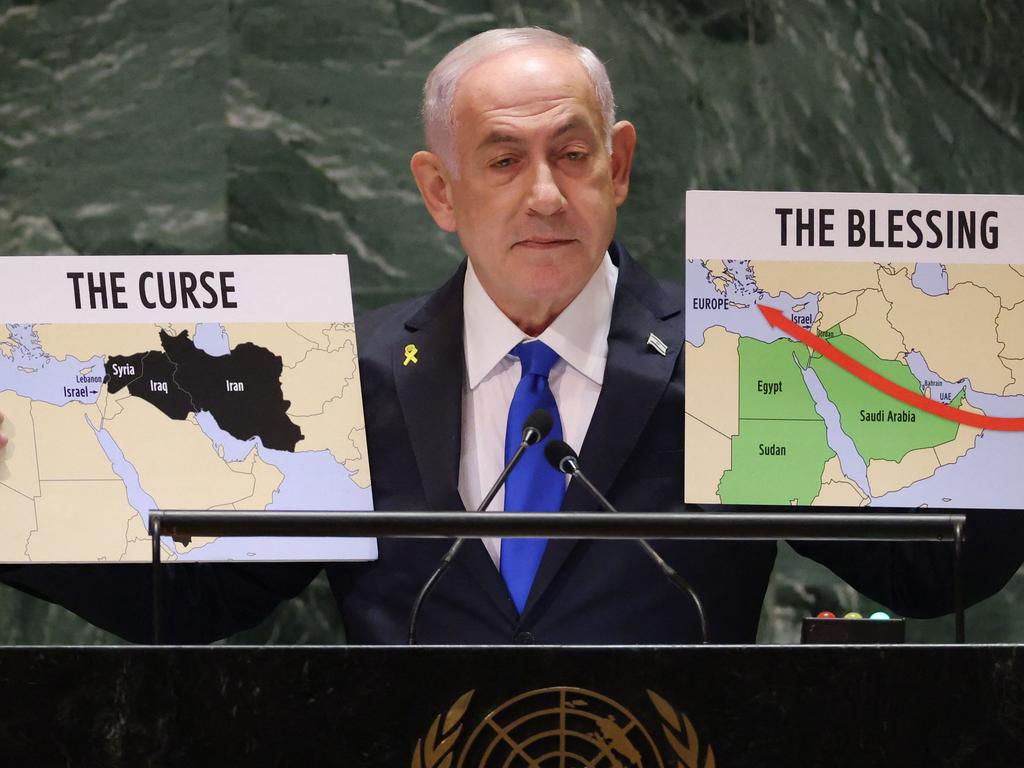
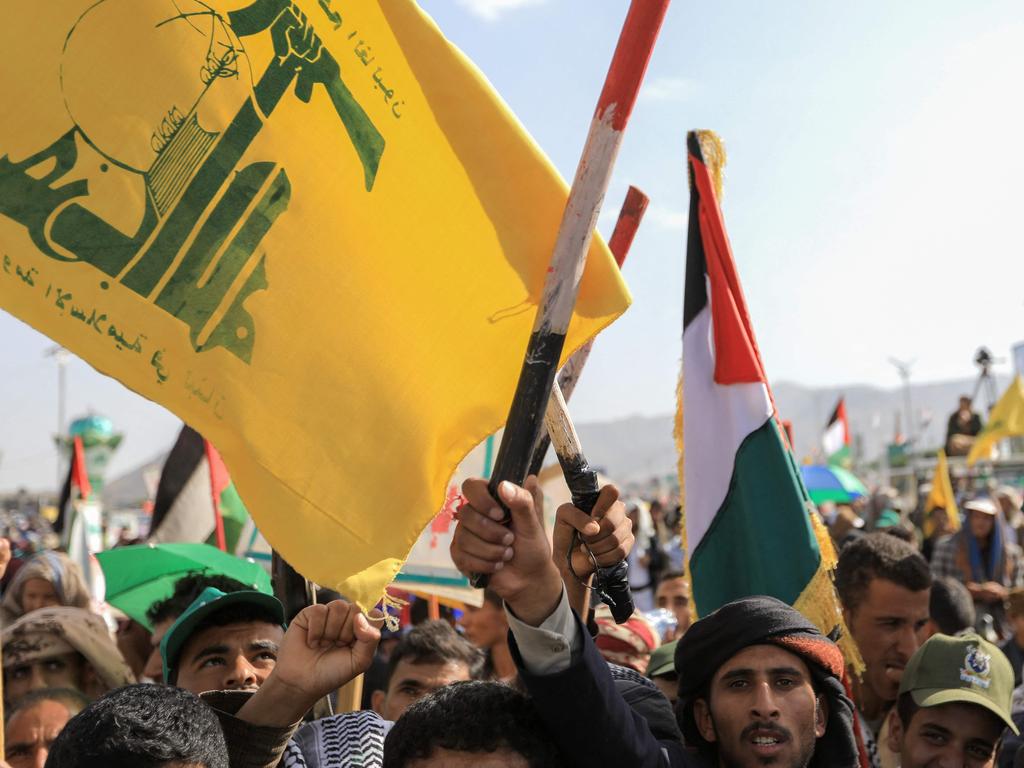
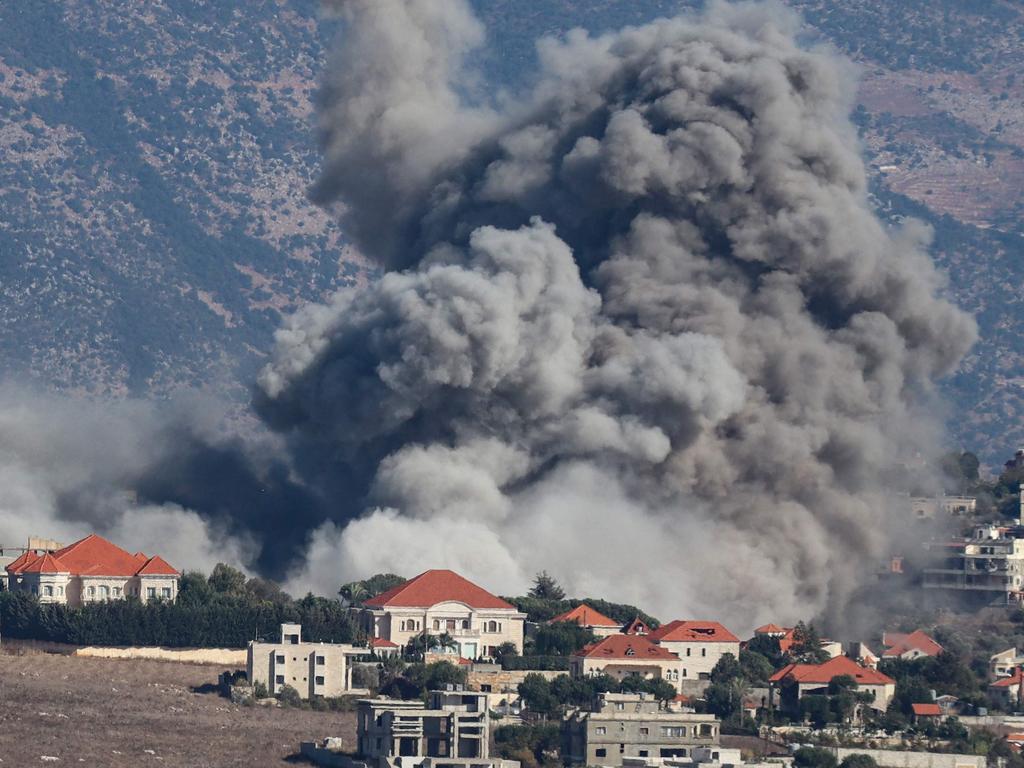


To join the conversation, please log in. Don't have an account? Register
Join the conversation, you are commenting as Logout